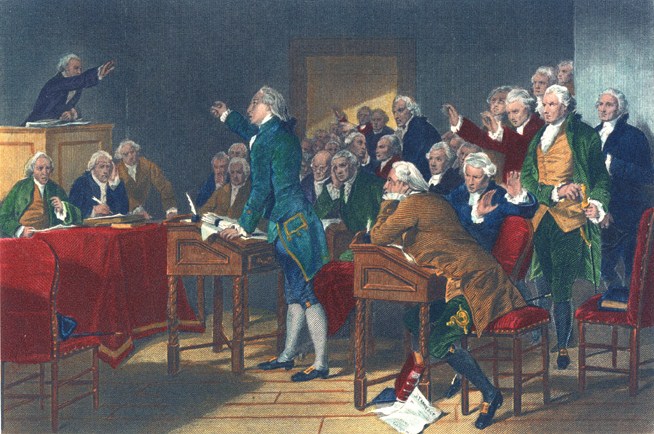Course Title: The Dubious Accomplishment of the 1st
The Dubious Accomplishment of the 1st 

 Continental Congress
Continental Congress
Instructor:  J. C. Thompson
J. C. Thompson
James Thompson holds undergraduate and graduate degrees in Philosophy from the University of Virginia. His interest in American history developed as a graduate student living on the Shadwell, Virginia farm of Thomas Jefferson’s daughter, Martha Jefferson Randolph. Thompson, who has now completed the first two texts in Commonwealth Books' “pocket book” histories of America,speaks frequently on subjects pertaining to America’s colonial history.
Instructor Contact:
Day:
 703-407-3719
703-407-3719
Night:
 540-832-7859
540-832-7859
Email:
 jct@commonwealthbook.org
jct@commonwealthbook.org
I. Course Description:
Course Description:
This course traces the events that led to the convening of the 1st Continental Congress in October 1774 and introduces the people who created the American Revolution. It then explains the conflict between its factions: patriots behind John Adams wanted a “bill of rights” with a Natural Law claim; loyalists behind Joseph Galloway opposed this revolutionary claim. The course then describes the back-room maneuvering by Adams and Secretary of the Congress Charles Thomson to insert Adams’s orphan declaration into the congressional record after it had adjourned. In recounting this (dubious) accomplishment of the 1st Continental Congress, the course provides historical perspective for politics in modern day America.
II.  Instructional Materials:
Instructional Materials:
Thompson, James: The Dubious Accomplishment of the First Continental Congress. Commonwealth Books 2010. ISBN: 978-0-9825922-2-9
III.  Other Books of Interest
Other Books of Interest
Alexander, John K. Samuel Adams: America's Revolutionary Politician. Rowman and Littlefield Publishers, 2002.
Ferling, John H. The Loyalist Mind: Joseph Galloway and the American Revolution. Pennsylvania State Univ Press, 1977. ISBN 0-271-00514-9.
McLynn, Frank. 1759: The Year Britain Became Master of the World. Pimlico, 2000.
Morgan, Edmund S. and Morgan, Helen M. The Stamp Act Crisis: Prologue to Revolution. Williamsburg: The Institute for Early American History and Culture, University of North Carolina Press. (1963)
Pares, Richard. King George III and the Politicians. Oxford University Press. (1953)
Thomas, Peter D. G. John Wilkes - A Friend to Liberty. (Oxford University Press, 1996)
Thompson, C. Bradley. John Adams and the Spirit of Liberty. University of Kansas Press. (1998).
Whiteley, Peter. Lord North: The Prime Minister who lost America. Hambledon Press. (1996) ISBN 1 85285 145 7
IV. Teaching Method
Teaching Method
Class narrations will refer to the text and be supported with colorful power-point slides that illustrate the events and people discussed in his narrative. Class time will be reserved for discussion of text and lecture materials.
V. Class Content
Class Content
Class I: The Agents of Empire and Rebellion, 1754 - 1767
The Agents of Empire and Rebellion, 1754 - 1767
Class 1 focuses on how William Pitt set England on its road to empire, how the burdensome financial obligations that attended its acquisition of French territory in North America created political problems in England and how the leaders of the King’s Prime Ministers transported this turmoil to Britain’s American colonies with their unprecedented new revenue policies. The men who superintended England’s emerging
empire and the American “patriots” who organized and managed the forthcoming American rebellion are introduced in this class.
Reading: The Dubious Accomplishment of the 1st Continental Congress, Chapter 1.
Class II:  The Patriotic Movement, 1767 - 1774
The Patriotic Movement, 1767 - 1774
Class 2 focuses on how a small circle of Boston activists led by Samuel Adams organized the citizens of city to resist Parliament’s new revenue policy and how this resistance shifted from obstructing objectionable policy to throwing off England’s “over-subordinate” government. It traces the progress of the “patriotic movement” through the seizure of the merchant ship Liberty and through the “Boston Massacre”, the “Gaspee Affair” and the “Boston Tea Party”. It recounts the consequences of Lord North’s punitive response to this last insulting act of vandalism and how closing the Port of Boston on 1 June 1774 transformed a resistance movement into an “independence” movement.
Reading: The Dubious Accomplishment of the 1st Continental Congress, Chapter 2.
Class III:  Congressional Politics, 5 September - 26 October 1774
Congressional Politics, 5 September - 26 October 1774
Class 3 focuses on the two-part plan Samuel and John Adams intended to implement during the Philadelphia Congress which convened on 5 September 1774. It recounts how Samuel quickly accomplished his part of the plan by winning passage of a “national” resolution condemning Lord North’s measures punishing the people of Boston. Attention then shifts to the hornet’s nest of opposition cousin John encountered in his effort to recognize Natural Law as a source of colonial right. The class will consider the details of this urresolved dispute between Adams and Joseph Galloway.
Reading: The Dubious Accomplishment of the 1st Continental Congress, Chapter 3.
Class IV:  The Great Political Hoax, October 14 - October 27 1774
The Great Political Hoax, October 14 - October 27 1774
Class 4 considers England’s unwritten constitution and the English common law on which it rests. It proceeds to consider the reverence loyalists like Joseph Galloway felt for these instruments and observes that this was the foundation for the loyalist opposition to Adams’s revolutionary new application of Nature’s Law. The class will learn that Adams never succeeded in overcoming loyalist objections, that the Congress never enacted his bill of rights and that Adams turned at last to his clever political ally, Secretary of the Congress Charles Thomson, who helped him insert his orphan document into the record if the Congress after the Congress adjourned. The course concludes with a summary of why the Adams cousins thought the bill was essential to the success of their independence movement and why events proved that it was not.
Reading: The Dubious Accomplishment of the 1st Continental Congress, Chapter 4.










